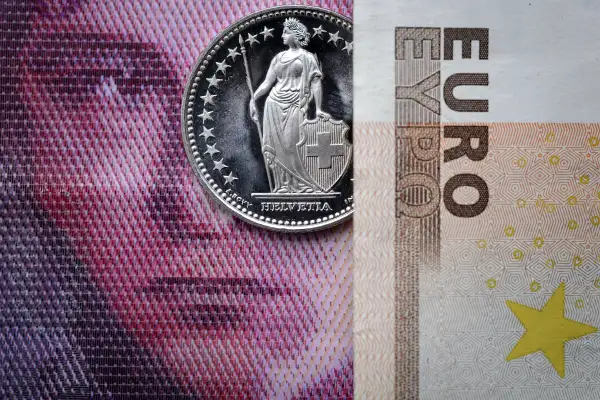Swiss Currency Has Shot Up 15% So Far Today. Here's Why That Matters
Money is not a client of any investment adviser featured on this page. The information provided on this page is for educational purposes only and is not intended as investment advice. Money does not offer advisory services.

The global economy got a lot more interesting today, and maybe a little more scary, when the Swiss National Bank ended its commitment to a fixed exchange rate between the Swiss Franc and the euro.
Currency markets went into a frenzy. The Swiss franc immediately rose 30% in value against the euro, mirrored by a spike in its U.S. dollar value. Some of those gains have pulled back, with the currency up about 15% at midday. That's still a huge move.
Okay, so it's been a big day for currency traders—and anyone planning on a ski trip to the Alps. But what's this mean for me?
The wildness in the market underscores the big economic story of the moment: Europe's slide toward a recession. In a globally connected economy, weak demand in Europe could weigh on the recovery in the U.S.
So what exactly happened?
Swiss francs rose because the Swiss central bank removed an artificial cap on the price of an asset people really, really want right now. The import of the story is less about the sudden price change today than about why people want to trade their euros for francs in the first place.
Switzerland isn't a part of the eurozone, the group of countries that share the euro as a currency. Swiss assets denominated in Swiss francs have long been considered a safe haven—a parking spot for investors around the globe when they are feeling jittery.
The eurozone has given people a lot be jittery about. In the wake of the Greek debt crisis at the beginning of the decade, investors jumped into francs, strengthening the currency against others. The problem with that for the Swiss is that it makes the goods produced by Swiss companies more expensive to export. So the Swiss National Bank (that's like their Federal Reserve) capped the value of a franc at 1.20 per euro.
It also decided to start charging negative interest rates, meaning investors in effect have to pay a fee to park their money in a Swiss bank. That's another way of fighting currency overvaluation. Today, at the same time as it cut the currency peg, the Swiss bank lowered the short-term interest rate from -0.25% to -0.75%. That is, they raised the penalty for stashing money there. Even so, the rally in francs shows there remains a lot of demand for doing just that.
Why did the Swiss cut the exchange rate peg?
The surprise move comes as Mario Draghi, president of the European Central Bank, is considering new measures to stimulate the eurozone economy. Many investors expect the ECB will take a page from the U.S. Federal Reserve and start buying long-term debt to push down long-term interest rates, a strategy known as quantitative easing.
A euro QE is broadly expected to bring down the value of the euro compared to the U.S. dollar. The Swiss, it seems, didn't want to tie the value of its own currency so closely to the policy makers at the ECB.
"Recently, divergences between the monetary policies of the major currency areas have increased significantly – a trend that is likely to become even more pronounced," the Swiss central bank said in a statement. "The euro has depreciated considerably against the US dollar and this, in turn, has caused the Swiss franc to weaken against the US dollar. In these circumstances, the SNB concluded that enforcing and maintaining the minimum exchange rate for the Swiss franc against the euro is no longer justified."
Pity Swiss watchmakers, though. Their timepieces just became more expensive for foreigners to buy.
